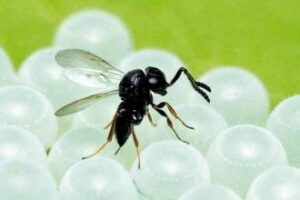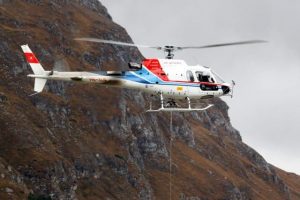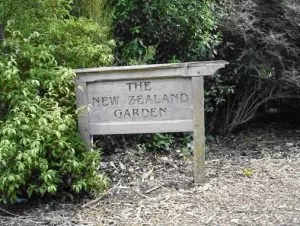Research on reducing uncertainty around introducing biological control agents, assessing risks to natural systems, developing treatments for imported commodities, speeding up assessment of pathogens in imported budwood, and developing environmental DNA monitoring tools are among projects funded in the latest Better Border Biosecurity (B3) investment.
B3 Director David Teulon says a total of $4 million dollars in research funding was allocated to new plant biosecurity-related science projects.
“This was an important year for B3 as over half of our total budget was available for reinvestment. Researchers have worked hard with our partners and stakeholders, such as MPI, DOC, EPA, industry and iwi, to co-develop projects that meet their needs. We plan our projects from the start for uptake and implementation,’’ he says.
“We will be looking to include at least 5 new PhD studentships in new projects and resources have also been set aside for our horizon scanning and thought pieces. Two kaupapa Māori projects were also funded.”
Dr Teulon says there are still gaps in the B3 research portfolio in areas such as tourism, climate change and social science, and it would be looking for new projects in these areas next year.
Dr Teulon says successful projects were reviewed by the B3 Science Advisory Group (SAG) in a two-step process starting in October 2021. Input was also received from NZ’s Biological Heritage National Science Challenge, the Plant Biosecurity Council (GIA), the Plant Biosecurity Research Initiative (PBRI) and the Centre of Excellence for Biosecurity Risk Analysis (CEBRA).
The full new project list is as follows, by B3 theme:
Theme A: Risk Assessment for Intentional Introductions
Researchers in Theme A work to improve tools and methodologies for assessing risk and predicting impacts for intentional introductions.
Testing the Toolbox: Reducing uncertainty around non-target impacts from biocontrol agents by validating tool predictions
This new 5 year project (led by [email protected]) will validate tools for regulators, decision-makers, applicants, and submitters, that predict the impact of putative biological control agents on non-target organisms.
He Waka Hourua: Mātauranga and western science navigate a safe course for future biocontrol
This new 3 year project (led by [email protected]) will define Mātauranga to establish its equivalence with Western science to support applications for the potential introduction of biocontrol agents to Aotearoa New Zealand.

Theme B: Risk Assessment for Unintentional Introductions
Researchers in Theme B work to improve tools and methodologies for identifying hazards, assessing risk, predicting impacts and ascertaining where in the system mitigation measures are best targeted for unintentional introductions.
New risk assessment and detection tools for cereal and grass pathogens on the seed import pathway
This new 1 year project (led by [email protected]) will document issues, establish priorities and develop a research plan with stakeholders for risk assessment and detection tools for pathogens of Poaceae in the seed importation pathway.
Predicting the spillover of pests and pathogens into natural ecosystems
This new 5 year project (led by Darren Ward [email protected]) will develop a host plant phylogeny index incorporating biological traits for both insects and pathogens, then assess the impact of this approach for biosecurity risk for indigenous plants.
Further development of the Integrated Biosecurity Risk Assessment Model (IBRAM) for pathogens
This new 4 year project (led by [email protected]) will modify the IBRAM-PEST model and create an IBRAM-PATH model including founder population, dispersal and establishment parameters, to quantify and manage micro-organism biosecurity threats.
Theme C: Pathway Risk Management
Researchers in Theme C work to develop fit-for-purpose tools and methodologies for reducing risks along importation pathways.
Novel sensor approaches to sniff out biosecurity threats
This 2 year project (led by [email protected]) will develop the sensor platform for a novel sensor technology.
Rapid screening method for optimising commodity treatments
This 5 year project (led by [email protected]) will develop a physiology-based template to rapidly evaluate phytosanitary treatments for high-risk insects in the commodity trade pathway.
De-risking the plant tissue culture pathway
This 1 year project (led by [email protected]) will document issues, establish priorities and develop a research plan with stakeholders for de-risking the plant tissue culture pathway.
Accelerated aging of plants to shorten the post-entry quarantine testing period
This 5 year project (led by [email protected]) will evaluate the development, expression of, and ability to detect high risk pathogens in accelerated plant breeding systems under containment.
The risk of diapausing pest insects on pathways to Aotearoa New Zealand
This 4 year project (led by [email protected]) will establish the significance of diapause – or a period of suspended development – for the survival in transit and eventual establishment of high-risk invasive insects.
Theme D: Diagnostics
Researchers in Theme D focus on fast, cost-effective, robust and accurate diagnostic methods and tools to enable informed biosecurity decisions.
Mass spectral fingerprinting for rapid biosecurity diagnostics: evolution from successful pilot studies to operational models
This 4 year project (led by [email protected]) will examine the use of mass spectral fingerprinting for (1) high throughput sample processing in an incursion and (2) attribution of informative biological characteristics for post-border detections.
Using images and deep learning for the identification of high-risk insect species
This 5 year project (led by Darren Ward [email protected]) will adapt and apply existing technology platforms and build image libraries of invasive and related species to underpin automation for rapid and accurate insect identification.
Metatranscriptomics informing the relevance of pathogen disease biomarkers in plants
This 5 year project ( led by [email protected]) will use dual application of nanopore sequencing technology with microbial communities in plants to detect high risk species from DNA and biomarkers of disease risk from RNA.
Beyond soil baiting: toward application of an eRNA diagnostic tool for Phytophthora
This 3 year project (led by [email protected]) will apply eRNA techniques for rapid identification of living pathogen communities in soils.

Theme E: Surveillance and Eradication
Researchers in Theme E work on tools and strategies for preparedness for and response to incursions of invasive plant pest species, including determining their presence or absence.
Expanding our eradication toolbox in NZ: Is biocontrol a feasible tool to incorporate in a response?
This 2 year project (led by [email protected]) assesses the feasibility of using inundative biological control releases, alone or in combination with other tools, to achieve eradication of invasive insects.
eDNA for terrestrial biosecurity monitoring
This 5 year project (led by [email protected]) will develop robust air sampling eDNA protocols for invasive species, including the development of reference libraries, mandates for data sovereignty and mitigation for false positives.

Theme X: Cross-theme research
Empowering Te Ao Māori responses to biosecurity threats to taonga species, native ecosystems, and communities
This 3 year project (led by [email protected]) will examine Māori priorities and aspirations surrounding biosecurity threats, incursions and responses through two mana whenua case studies.


